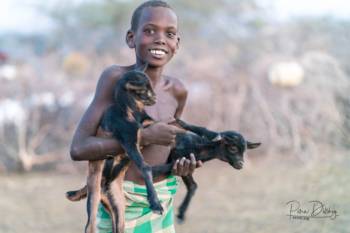CELEP - Coalition of European Lobbies for Eastern African Pastoralism
The Members of the Coalition work together to lobby their national governments, European Union (EU) bodies (Council, Parliament and Commission) as well as other policy-formulating bodies/ agencies in Europe (e.g. the European Headquarters of the United Nations in Geneva and the FAO in Rome) to explicitly recognise and support pastoralism (and the people who practise pastoralism: pastoralists) in the drylands of Eastern Africa.
Priority lobbying issues. In its activities to lobby and inform the EU and its Member States, CELEP chose at its outset to focus on:
- Recognition of pastoralism as a valuable & viable livelihood system that contributes to national & regional economies, food security, employment & sustainable management of natural resources
- Mobility as a crucial condition for sustainable pastoralism and for community security in conflict areas, also across national borders
- Pastoralists’ rights of access to and management of natural resources (land, vegetation, water etc), also as a contribution to community security in conflict areas
- Pastoralism as a positive example of resilience in adapting to climate change.
-
The Members of the Coalition worktogether to lobby their national governments, European Union (EU) bodies (Council, Parliament and Commission) as well as other policy-formulating bodies/ agencies in Europe (e.g. the European Headquarters of the United Nations in Geneva and the FAO in Rome) to...
-
On 13 December 2021, CELEP presented a webinar on pastoralism and climate change, hosted by European members DITSL (German Institute for Tropical and Subtropical Agriculture and Transdisciplinary Socio-ecological Landuse Research) and VSFB (Vétérinaires sans Frontières Belgium). It was attended...
-
The paper “The challenges of community-based natural resource management in pastoral rangelands” (2021) by Lance Robinsonet al, published inSociety & Natural Resources34(9): 1213–1231, compares five case studies – two from Kenya, two from Ethiopia and one from Tunisia – to identify contextual...
-
Drawing on case studies in Ethiopia and Kenya, the paper “Climate change policy narratives and pastoralist predicaments in the Horn of Africa: insights from Ethiopia and Kenya” (2021, 4pp), presented by Tom Campbell at the Joint International Grassland & Rangeland Congress 2021, examines the...
-
Mobility is a vital strategy used by pastoralists to capitalise on the scarce availability of resources in variable environments, making pastoralism economically feasible and environmentally sustainable. Through mobility, pastoralists can produce animal-source foods in the rangelands and also...
-
In the article “Drought management in ASAL areas: enhancing resilience or fostering vulnerability?“, published on 19 February 2022 inThe Elephant, Tahira Shariff Mohamed describes the massive investments that have been made in pastoral development projects, resilience building and “climate-smart”...
-
The report on the “Horn of Africa and Sahel Virtual Knowledge Share Fair: Promoting innovation to build resilience against climatic shocks” that was held in October 2020 is now online. The Intergovernmental Authority on Development (IGAD), in partnership with the Permanent Interstate Committee...
-
Increasingly frequent and severe droughts pose a big challenge for pastoralists in the Horn of Africa. Livestock drought insurance (LDI) is being tested as a means to manage these risks. In the article “Ecological vulnerability through insurance? Potential unintended consequences of livestock...
-
A key objective in piloting Participatory Rangeland Management (PRM) in Kenya and Tanzania was to support empowerment of pastoral women – to improve access to material, human and social resources; to enable women to have greater control over setting goals and taking action to achieve them; and to...
-
The change in relationship between pastoralists and central government brought about by Ethiopia’s Productive Safety Net Programme (PSNP) is explored in the article “Development, governmentality and the sedentary state: the productive safety net programme in Ethiopia’s Somali pastoral periphery”...
-
The paper “Rush for the “wastelands”: revaluing pastoral land in the light of renewable energy”(2022) (Green energy + pastoralism paper,Powerpoint slides) by Ann Waters-Bayer and Hussein Tadicha Wario, was based on a study commissioned by the Heinrich-Böll-Stiftung in Germany. It looked into how...
-
The Food and Agricultural Organization of the United Nations (FAO) has published “Pastoralism: making variability work”(2021, Animal Production & Health Paper 185, 58pp) written by Saverio Krätli and Ilse Koehler-Rollefsen with comments and guidance from FAO staff and pastoralist specialists...
-
The SNV learning brief “Strengthening pastoralist organisations for climate-resilient development” (2020, 8pp) highlights the central role that civil society organisations (CSOs) play in championing the interests of pastoralists in climate policy development and implementation, as well as...
-
On 15 March 2022, the United Nations General Assembly (UNGA) declared 2026 the International Year of Rangelands & Pastoralists (IYRP). This final approval is the culmination of an IYRP movement that grew over several years to become a global coalition of over 300 pastoralist and supporting...
-
The Kenyan Government has passed laws that routinely undervalue pastoralists’ land and undermine pastoralism as a system of production and source of livelihood in the drylands. In his article “The unjust valuation of pastoralists’ land in Kenya”, published online inThe Elephanton 2 October 2021,...
-
In Ethiopia, formal laws assert that women have equal rights regarding land use and access. However, the pastoral areas are often highly influenced by religious and customary systems under which women tend to have weaker land rights. The report“Women’s land rights: customary rules and formal laws...
